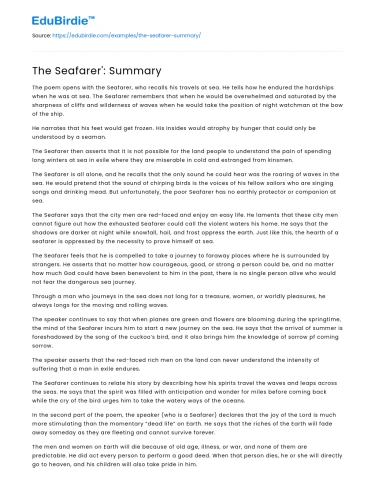The poem opens with the Seafarer, who recalls his travels at sea. He tells how he endured the hardships when he was at sea. The Seafarer remembers that when he would be overwhelmed and saturated by the sharpness of cliffs and wilderness of waves when he would take the position of night watchman at the bow of the ship.
He narrates that his feet would get frozen. His insides would atrophy by hunger that could only be understood by a seaman.
Save your time!
We can take care of your essay
- Proper editing and formatting
- Free revision, title page, and bibliography
- Flexible prices and money-back guarantee
The Seafarer then asserts that it is not possible for the land people to understand the pain of spending long winters at sea in exile where they are miserable in cold and estranged from kinsmen.
The Seafarer is all alone, and he recalls that the only sound he could hear was the roaring of waves in the sea. He would pretend that the sound of chirping birds is the voices of his fellow sailors who are singing songs and drinking mead. But unfortunately, the poor Seafarer has no earthly protector or companion at sea.
The Seafarer says that the city men are red-faced and enjoy an easy life. He laments that these city men cannot figure out how the exhausted Seafarer could call the violent waters his home. He says that the shadows are darker at night while snowfall, hail, and frost oppress the earth. Just like this, the hearth of a seafarer is oppressed by the necessity to prove himself at sea.
The Seafarer feels that he is compelled to take a journey to faraway places where he is surrounded by strangers. He asserts that no matter how courageous, good, or strong a person could be, and no matter how much God could have been benevolent to him in the past, there is no single person alive who would not fear the dangerous sea journey.
Through a man who journeys in the sea does not long for a treasure, women, or worldly pleasures, he always longs for the moving and rolling waves.
The speaker continues to say that when planes are green and flowers are blooming during the springtime, the mind of the Seafarer incurs him to start a new journey on the sea. He says that the arrival of summer is foreshadowed by the song of the cuckoo’s bird, and it also brings him the knowledge of sorrow pf coming sorrow.
The speaker asserts that the red-faced rich men on the land can never understand the intensity of suffering that a man in exile endures.
The Seafarer continues to relate his story by describing how his spirits travel the waves and leaps across the seas. He says that the spirit was filled with anticipation and wonder for miles before coming back while the cry of the bird urges him to take the watery ways of the oceans.
In the second part of the poem, the speaker (who is a Seafarer) declares that the joy of the Lord is much more stimulating than the momentary “dead life” on Earth. He says that the riches of the Earth will fade away someday as they are fleeting and cannot survive forever.
The men and women on Earth will die because of old age, illness, or war, and none of them are predictable. He did act every person to perform a good deed. When that person dies, he or she will directly go to heaven, and his children will also take pride in him.
The speaker of the poem observes that in Earth’s kingdom, the days of glory have passed. He says that the glory giving earthly lords and the powerful kings are no more. Now, weak men hold the power of Earth and are unable to display the dignity of their predecessors. Men’s faces grow pale because of their old age, and their bodies and minds weaken.
It does not matter if a man fills the grave of his brother with gold because his brother is unable to take the gold with him into the afterlife. He asserts that it is not possible to hide a sinned soul beneath gold as the Lord will find it.
The speaker warns the readers against the wrath of God. He is the wrath of God is powerful and great as He has created heavens, earth, and the sea. He asserts that a man who does not fear God is foolish, and His power will catch the immodest man by surprise while a humble and modest man is happy as they can withdraw strength from God.
He says that the hand of God is much stronger than the mind of any man. Despite the fact that a man is a master in his home on Earth, he must also remember that his happiness depends on God in the afterlife. Thus, it is in the interest of a man to honor the Lord in his life and remain faithful and humble throughout his life.






 Stuck on your essay?
Stuck on your essay?

